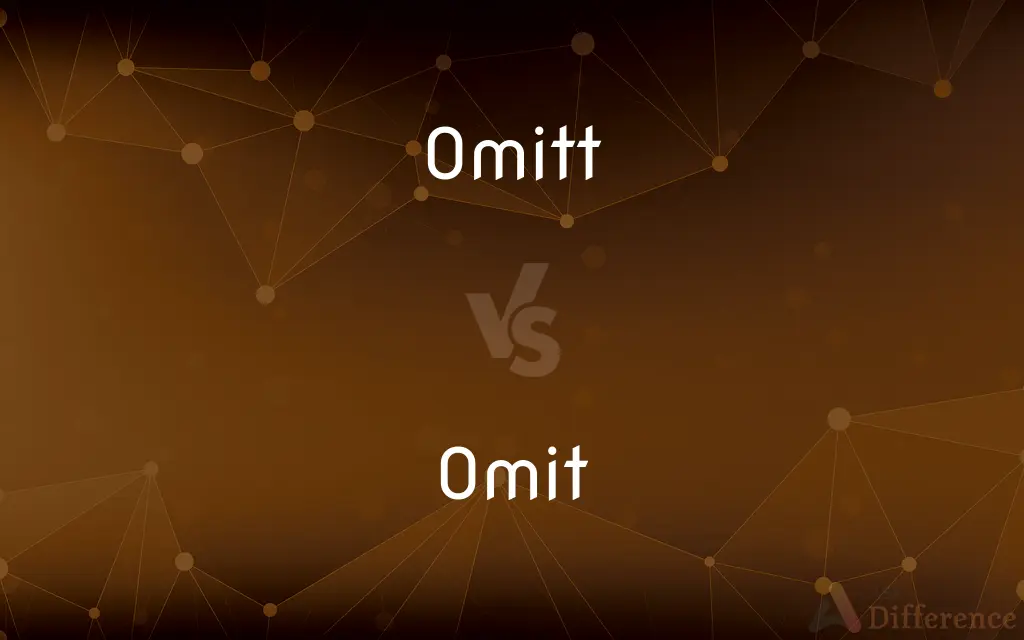Omitt vs. Omit — Which is Correct Spelling?
By Tayyaba Rehman — Updated on March 24, 2024
Omitt is the incorrect spelling, while Omit is correct, meaning to leave out or exclude.

Table of Contents
Which is correct: Omitt or Omit
How to spell Omit?

Omitt
Incorrect Spelling

Omit
Correct Spelling
ADVERTISEMENT
Key Differences
Remember "omit" is like "commit" but with one less "c" and one "m".
Associate "omit" with "edit", both have a concise spelling without extra letters.
Visualize "omit" as "one missing thing", hence only one "t".
Recall that "omit" sounds like "admit" with a single "t" at the end.
Use the phrase, "Don't add, just omit", emphasizing not adding an extra "t".
ADVERTISEMENT
How Do You Spell Omit Correctly?
Incorrect: She decided to omitt the last chapter of the book because it was unnecessary.
Correct: She decided to omit the last chapter of the book because it was unnecessary.
Incorrect: It's important not to omitt any steps in the experiment.
Correct: It's important not to omit any steps in the experiment.
Incorrect: The teacher asked us to omitt any irrelevant details from our essays.
Correct: The teacher asked us to omit any irrelevant details from our essays.
Incorrect: I need to omitt dairy from my diet for health reasons.
Correct: I need to omit dairy from my diet for health reasons.
Omit Definitions
To leave out or exclude from consideration.
She decided to omit the last chapter from her book.
To discard or drop by intention.
The chef omitted salt to keep the dish low-sodium.
To avoid or refrain from mentioning.
He omitted his past mistakes from the conversation.
To fail to include or mention; leave out
Omitted an important detail from the report.
To fail or neglect to do (something)
Omitted his daily walk during our visit.
To fail or neglect (to do something)
I omitted to mention that I don't eat meat.
(transitive) To leave out or exclude.
(intransitive) To fail to perform.
To delete or remove; to strike.
To neglect or take no notice of.
To let go; to leave unmentioned; not to insert or name; to drop.
These personal comparisons I omit.
To forbear or fail to perform or to make use of; to leave undone; to neglect; to pass over.
Her father omitted nothing in her education that might make her the most accomplished woman of her age.
Prevent from being included or considered or accepted;
The bad results were excluded from the report
Leave off the top piece
Leave undone or leave out;
How could I miss that typo?
The workers on the conveyor belt miss one out of ten
To neglect or fail to include.
Please don't omit any details from the report.
To bypass or pass over.
We can omit the middle step for efficiency.
Omit Meaning in a Sentence
Please omit your personal feelings from this professional report.
He chose to omit the fact that he had been fired from his previous job.
The article was too long, so the editor had to omit some paragraphs.
During revision, it's helpful to omit unnecessary words for clarity.
Make sure to omit any spoilers when you're discussing the book with friends.
The summary should omit the less important events of the chapter.
The director decided to omit the controversial scene from the movie.
The software update will omit all previously identified bugs.
Don't omit your signature at the bottom of the letter.
I forgot to omit the salt in the recipe, and now the dish is too salty.
When baking cookies, don't omit the baking soda; it's crucial for them to rise.
To keep the secret, they had to omit several details from their story.
When telling the story, he decided to omit the part about the lost keys.
In the final draft, she decided to omit the first paragraph entirely.
Please omit loud music after 10 PM to avoid disturbing the neighbors.
You can omit the optional exercises if you're short on time.
They had to omit some stops from their trip to stay within budget.
It's a good practice to omit jargon when writing for a general audience.
For a healthier meal, omit the cheese and add more vegetables.
To simplify the equation, first omit the zero terms.
The teacher reminded us to omit the cover page from the page count.
Omit any reference to personal information in your online posts.
To make the cake dairy-free, omit the butter and use oil instead.
Omitting details can sometimes make a story more intriguing.
If you're allergic, omit nuts from the recipe.
Omit Idioms & Phrases
Omit nothing
To include all details or information.
In her diary, she omits nothing, sharing both her highs and lows.
Omit from consideration
To not consider something; to exclude.
The more unrealistic options were omitted from consideration during the planning stage.
Omit by mistake
To accidentally leave something out.
She omitted her brother's name by mistake when sending out the party invitations.
Omit to mention
To forget or choose not to include a particular detail.
He omitted to mention that he had never climbed a mountain before agreeing to the trip.
To omit details
To leave out certain parts of a story or information.
When he told the story, he chose to omit details that would incriminate his friend.
Common Curiosities
Why is it called Omit?
"Omit" comes from the Latin word "omittere", meaning "to let go" or "to send away".
What is the verb form of Omit?
The verb form is "omit".
What is the pronunciation of Omit?
It is pronounced as /oʊˈmɪt/.
Which vowel is used before Omit?
The vowel "a" is often used before "omit", as in "an omission".
Which preposition is used with Omit?
The preposition "from" is commonly used with "omit", as in "omit from".
What is the root word of Omit?
The root word is the Latin "omittere".
What is the singular form of Omit?
The singular form is "omit".
What is the plural form of Omit?
The verb "omit" doesn't have a plural form, but the noun derived from it, "omission", can be pluralized as "omissions".
Which conjunction is used with Omit?
Any conjunction can be used depending on the context, such as "and", "or", or "but".
Which article is used with Omit?
Depending on the context, both "a" and "the" can be used.
Is Omit a countable noun?
"Omit" is a verb. However, its noun form "omission" is countable.
Is Omit a collective noun?
No, "omit" is not a collective noun.
How do we divide Omit into syllables?
O-mit.
What is a stressed syllable in Omit?
The second syllable, "mit", is stressed.
What is the first form of Omit?
The first form (base form) is "omit".
Is Omit a noun or adjective?
"Omit" is primarily a verb.
Is Omit an adverb?
No, "omit" is not an adverb.
Is Omit an abstract noun?
No, "omit" itself is not an abstract noun, but "omission" (derived from "omit") is.
Is the word Omit is Gerund?
"Omitting" is the gerund form of "omit".
What is another term for Omit?
Another term for "omit" is "exclude" or "leave out".
Which determiner is used with Omit?
Determiners like "this", "that", "my", and "his" can be used, depending on the context.
Is Omit a negative or positive word?
"Omit" is neutral, but its connotation can be either positive or negative based on context.
Is Omit a vowel or consonant?
"Omit" is a word containing both vowels and consonants.
Is the Omit term a metaphor?
No, but it can be used metaphorically in certain contexts.
Is the word “Omit” a Direct object or an Indirect object?
"Omit" can take a direct object, for instance, "He omits the sugar".
What part of speech is Omit?
"Omit" is a verb.
What is the opposite of Omit?
The opposite is "include".
What is the third form of Omit?
"Omitted" is also the past participle form.
How is Omit used in a sentence?
"When baking, she prefers to omit the nuts due to allergies."
Is the word Omit is imperative?
"Omit" can be used in an imperative manner, as in "Omit the last step!".
What is the second form of Omit?
"Omitted" is the past simple form of "omit".
How many syllables are in Omit?
There are two syllables in "omit".
Share Your Discovery

Previous Comparison
Diarreah vs. Diarrhea
Next Comparison
Manuver vs. ManeuverAuthor Spotlight
Written by
Tayyaba RehmanTayyaba Rehman is a distinguished writer, currently serving as a primary contributor to askdifference.com. As a researcher in semantics and etymology, Tayyaba's passion for the complexity of languages and their distinctions has found a perfect home on the platform. Tayyaba delves into the intricacies of language, distinguishing between commonly confused words and phrases, thereby providing clarity for readers worldwide.














































